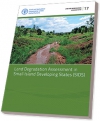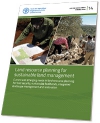News

16/02/2018
Interview series from the World Agricultures Watch International Workshop “Understanding Farming Diversity for Better Policy-making and Project Targeting” 19-20 December 2017, IFAD Headquarters, Rome, Italy

21/12/2017
With the world needing to provide roughly 50 percent more food by 2050 – even as climate change, land degradation, watery scarcity and other challenges threaten productivity – it is clear that agricultural systems must transform.
The problem is that no “one size fits all solution” exists, despite current policy designs...

13/12/2017
Adapting to climate change with climate smart irrigation
Agriculture has a large role to play in reducing poverty in The Gambia. 30 percent of the country’s GDP comes from agriculture. It is the second largest sector in the economy and employs about 44 percent of the country’s active work force. Smallholder farmers supply 90 percent of the domestically...

05/12/2017
Cherishing the ground we walk on: Why we should appreciate our soils
Soil is where it all begins. Few people know that soils are a non-renewable resource. It takes over 1000 years to make 1 cm of soil. This means that in our lifetime, all the soil we see is all there is. Soils do amazing things for us that we sometimes...

15/11/2017
Small Island Developing States (SIDS) have it rough in many ways. They are perhaps best known for their vulnerability to climate change, as a result of high poverty, rural populations, dependence on traditional agriculture, tourism-based economies and other factors.
These same characteristics make land degradation an equally worrisome issue, creating knock-on...

07/11/2017
New interview series highlights the impacts of climate change on small-scale irrigation in Gambia, and what farmers in the region are doing to combat them.
In the framework of the project “Adapting small-scale irrigation to climate change in West and Central Africa”, farmers from Gambia talk about the devastating impacts of climate change on their farming activities and crops, leading to crop failure and food insecurity. They also describe the measures they adopted to build...

22/09/2017
Sustainable land, soil and water management will play a growing role in ending and reversing land degradation, and increasing food production, after over 100 countries endorsed many FAO-led initiatives at the 13th conference of the parties to the UN Convention to Combat Drought and Desertification (UNCCD).
At the meeting in Ordos,...

14/09/2017
An FAO partnership with Google is helping collect and analyse land degradation data

08/09/2017
Thematic workshop - CIHEAM Bari, Bari, Italy - 28-31 August 2017
The development of the water sector is crucially important to cope with water scarcity and with increasing food demand, particularly in countries where agriculture plays an important role both in economic and social development accounting up to 60 percent of total labour force. Notwithstanding the importance of the sector, productivity...

06/09/2017
One-third of planet’s land is degraded, hitting food production and damaging livelihoods
Ordos, China, 6 September 2017 – Land-resource planning is crucial to restore the one third of land already degraded and prevent further degradation, but existing and new tools should be more widely used to help agriculture feed growing populations, according to new FAO research.
Land resource planning for sustainable...
